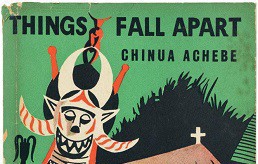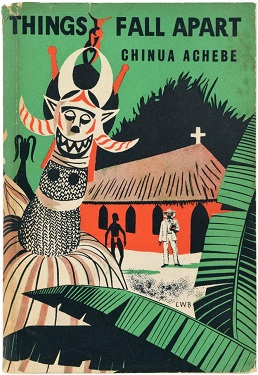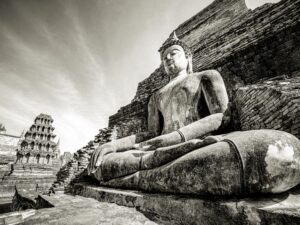
Things Fall Apart: Chinua Achebe’s Novel Summary and Review
Chinua Achebe’s “Things Fall Apart” is a key work in Nigerian and post-colonial literature. It explores Igbo culture, colonialism, and the struggle between old and new ways. This review will dive into its deep themes and storytelling, showing why it’s loved worldwide.

The story centers on Okonkwo, a respected Igbo man, whose life changes with European colonizers’ arrival. The book takes us deep into Igbo culture, showing their customs, beliefs, and social life. Achebe’s vivid portrayal of this society sets the stage for the clash between tradition and change.
Okonkwo’s story shows how colonialism affects indigenous communities. It looks at power, identity, and keeping cultural heritage alive under foreign rule. Achebe’s detailed look at these issues makes the post-colonial experience both moving and thought-provoking.
A Book Summary and Review on Things Fall Apart by Chinua Achebe
Chinua Achebe’s Things Fall Apart is a deep dive into Igbo culture and the effects of European colonialism. It tells the story of Okonkwo, a respected Igbo man, as he faces the changes in his society in the late 19th century.
Things Fall Apart: Exploring Nigerian Literature and Igbo Culture
Achebe’s storytelling gives readers a deep look into Igbo culture. We learn about its customs, traditions, and social setup. The book shows the importance of family and the roles of elders and the clan council in Igbo society.
It takes us into the heart of Igbo life. We see their farming, festivals, and rituals. This brings the community to life.
Things Fall Apart: Themes of Colonialism and Tradition vs. Modernity
Things Fall Apart focuses on the clash between traditional Igbo life and European colonialism. Achebe shows the struggle between the old and new ways. The arrival of Christian missionaries and the colonial powers shakes up the Igbo social and spiritual life.
The book looks at power, resistance, and keeping cultural identity. It shows the effects of colonialism on individuals and communities.
“The white man is very clever. He came quietly and peaceably with his religion. We were amused at his foolishness and allowed him to stay. Now he has won our brothers, and our clan can no longer act like one. He has put a knife on the things that held us together and we have fallen apart.”
Okonkwo’s story shows how these changes affect people and communities. It’s a strong look at colonialism and the struggle between tradition and modernity.

Achebe’s work combines Nigerian literature and Igbo culture with themes of colonialism and change. Things Fall Apart is a key book in post-colonial literature. It still moves and teaches readers and scholars today.
Things Fall Apart: The Powerful Storytelling of Chinua Achebe
Chinua Achebe’s “Things Fall Apart” is a powerful story that has touched readers all over the world. It’s a key work in Nigerian and post-colonial literature. The book is known for its deep cultural insights, vivid characters, and themes like tradition and colonialism.
Achebe’s writing is known for its skillful use of language. He mixes English with Igbo phrases and sayings, making the story feel real and engaging. The way the story switches between different characters and times helps readers understand the Igbo culture and its changes.
“The white man is very clever. He came quietly and peaceably with his religion. We were amused at his foolishness and allowed him to stay. Now he has won our brothers, and our clan can no longer act like one. He has put a knife on the things that held us together and we have fallen apart.”
Chinua Achebe is a literary giant, not just in Nigerian literature but in post-colonial literature too. Scholars have deeply analyzed his work. They see its lasting impact and its effect on new writers.

Achebe showed readers the beauty of Igbo culture, customs, and beliefs. His stories bring a world once unknown to Western readers to life. His ability to tell a story that connects the universal with the specific has made “Things Fall Apart” a classic.
Things Fall Apart: Analyzing Family Dynamics and Masculinity
In Chinua Achebe’s famous book “Things Fall Apart,” family and masculinity are key to understanding Igbo culture. Achebe explores Okonkwo’s family deeply. He shows the high expectations and pressures on gender roles in the Igbo community.
The Complex Relationships in Igbo Society
Okonkwo is a key figure in his Igbo village. He strongly believes in traditional masculinity, which affects his family life. Achebe skillfully shows the tension between Okonkwo’s masculine ideals and his family duties and feelings.
Okonkwo’s relationship with his father, Unoka, shows the cultural gap in Igbo masculinity. Unoka is seen as weak and not ambitious, unlike Okonkwo’s drive to be a man. This shows the deep conflict between generations in Igbo masculinity and its effect on families.
Okonkwo also struggles with his son, Nwoye, because of Igbo masculinity expectations. Nwoye doesn’t fit the masculine mold and turns to Christianity, upsetting Okonkwo. This leads to a big rift between them.

“He [Okonkwo] was a man of action, a man of war. Unlike his father, he could stand the look of blood.” – Chinua Achebe, “Things Fall Apart”
Achebe’s storytelling lets us see the complex Igbo family dynamics. The push for masculinity and keeping traditions often clash. This deeply affects the characters’ lives in meaningful ways.
Cultural Clash and Post-Colonial Literary Criticism
Chinua Achebe’s “Things Fall Apart” is a key work in post-colonial literature. It deeply explores the clash between the Igbo culture and European colonialism. This has led to a lot of literary analysis.
The story is about the Igbo people and their complex relationship with the colonizers. Achebe’s storytelling shows how colonization changed the Igbo society deeply. It challenges the old stories that made Europe seem superior.
Scholars look at Achebe’s work through post-colonial literary criticism. They see how it challenges the old views of Africa. The book tells the Igbo people’s stories, showing Africa as more than just a place needing European help.
The book also talks about the struggle between old traditions and new ways. Critics have studied how it shows different roles in Igbo society. They look at family, gender, and social ranks in Igbo culture.
“Things Fall Apart” stands as a powerful testament to the resilience and complexity of African cultures, challenging the reductive and often distorted representations that had long permeated Western literature and scholarship.
Achebe’s work is praised for giving a voice to those ignored. It shows the real effects of colonialism on traditional societies. The book’s impact is still felt in discussions on cultural clashes and identity today.
Conclusion
Chinua Achebe’s “Things Fall Apart” is a deep dive into Nigerian literature and Igbo culture. It shows the impact of colonialism on society. Achebe’s story touches readers of all ages, making them think about tradition, modern life, and how different worlds clash.
The book looks closely at family life and what it means to be a man in Igbo society. It gives us a detailed look at life before colonial times in Africa. Achebe mixes themes like colonialism, old ways vs new, and how outside forces change communities. This makes “Things Fall Apart” still important today in talks about Nigerian literature and Igbo culture.
When readers read this book, they face big questions. They see how old traditions meet new changes. Achebe’s way of exploring these ideas makes him a key figure in African literature. It also makes us think about the big issues and chances we face because of colonial history.
FAQ
What is the main focus of the article on Chinua Achebe’s “Things Fall Apart”?
The article gives a detailed summary and review of Chinua Achebe’s famous novel, “Things Fall Apart.” It looks at the deep portrayal of Igbo culture. It also explores the themes of colonialism and the struggle between old and new ways. Plus, it talks about the storytelling that has made this book a key part of Nigerian and post-colonial literature.
How does the article examine the themes of colonialism and tradition vs. modernity in the novel?
The article goes deep into the novel’s main themes. It looks at how European colonialism affected traditional Igbo life. It also talks about the conflict between old and new ways. Achebe’s work challenges the Euro-centric view and gives a detailed look at colonialism’s effects on African societies.
What aspects of Igbo culture and family dynamics are explored in the article?
The article looks at the detailed portrayal of Igbo society and culture in “Things Fall Apart.” It focuses on the complex family dynamics of the main character, Okonkwo. It also looks at the roles and relationships within Igbo society, especially the norms of masculinity.
How does the article analyze Chinua Achebe’s storytelling techniques and the literary significance of the novel?
The article goes into Chinua Achebe’s skillful storytelling in “Things Fall Apart.” It talks about his use of language and narrative methods. It also looks at how he uses cultural references to make the story come alive. The article also talks about the book’s lasting impact and its place in post-colonial literature.
What is the overall conclusion drawn from the comprehensive review of “Things Fall Apart”?
The article’s conclusion summarizes the main points from the review. It highlights the book’s lasting importance. It also talks about its ongoing relevance in discussions about Nigerian literature, Igbo culture, and the effects of colonialism.


